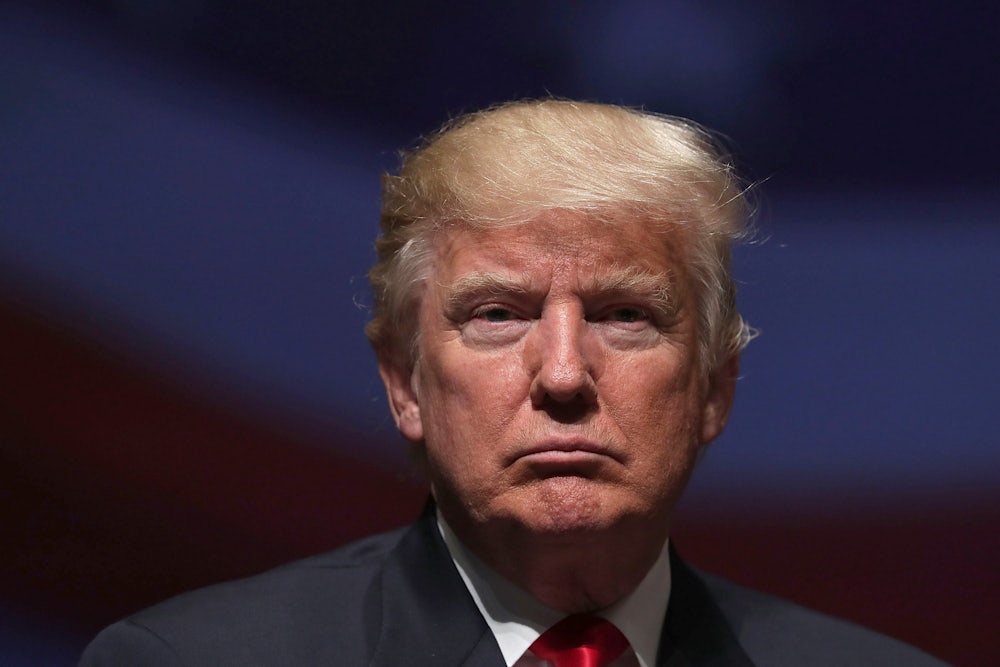It’s a fool’s errand to search for method in Donald Trump’s campaign tactics, but if you were tasked with ascribing method to his behavior in recent weeks, you’d have to conclude his aim is to further divide his own party and unite the opposition. That has been the effect, anyway, of all of Trump’s late-campaign stunts: inviting Bill Clinton’s accusers to the second debate, bringing Barack Obama’s estranged half-brother to the third debate, and attacking Hillary Clinton abusively during what was meant to be a lighthearted roast at the Al Smith dinner.
Trump’s ongoing claim that the election is being “rigged” through voter fraud in minority communities, and his threat to reject the validity of the election result, are no exceptions. “I’ll look at it at the time,” Trump told Chris Wallace, the moderator of last week’s debate in Las Vegas, later adding, “I’ll keep you in suspense, OK?”
Republicans were reportedly despondent. A handful of GOP officeholders, and a number of conservative commentators, have since come forward to condemn Trump for vandalizing the underpinnings of democracy. The others who have remained silent, for fear of running afoul of his supporters, must nonetheless be concerned that Trump is undercutting his own turnout efforts by increasing the perception among those supporters that voting is pointless. By contrast, Trump’s efforts to incite voter intimidation and accuse minority voters of ballot-stuffing is at least correlated with, if not causing, an increase in early voting among Democrats.
Trump’s antics are forcing Republicans to confront a nightmare scenario in which they underperform the polls, which are already ominous for down-ballot GOP candidates. But the truly horrifying scenario for them is one they probably haven’t thought of yet, and it isn’t that Trump refuses to concede when Clinton defeats him.
The best Republicans can hope for between now and November 8 is minimal drama: Trump dials down the conspiratorial, Breitbart-inspired agitprop. He promises to accept the results of the election. If no major new damning Trump revelations surface, while Clinton faces a steady rollout of hacked, unflattering campaign emails, the polling gap would narrow and Republicans further down the ticket would stand a better chance of staving off a Democratic wave.
It’s far likelier, though, that the news environment will deteriorate for Republicans as Democrats unload their most potent opposition research and more of Trump’s enemies and victims come forward. Trump could face more official defections. His polling gap would presumably widen. And suddenly the question would become not whether he’ll make excuses for his own defeat, but which excuse he’ll settle on.
At the Nevada debate, Clinton made a compelling case that Trump is mentally incapable of conceding to failure.
“Every time Donald thinks things aren’t going in his direction, he claims whatever it is, is rigged against him,” she said. “The FBI conducted a yearlong investigation into my e-mails. They concluded there was no case. He said the FBI was rigged. He lost the Iowa caucus, he lost the Wisconsin primary, he said the Republican primary was rigged against him. Then, Trump University gets sued for fraud and racketeering. He claims the court system and the federal judge is rigged against him. There was even a time when he didn’t get an Emmy for his TV program three years in a row and he started tweeting that the Emmys were rigged against him.”
Trump reacts to the narcissistic injuries of defeat and failure by reframing them as conspiracies. He’ll sooner accuse his opponent of cheating than lay his king on its side. But Republicans have to allow for the possibility, however slim, that Trump will do neither of these things, and flip the whole chess board over instead.
Positing a vast conspiracy is already becoming untenable for him, placing him at odds with his campaign manager and his eldest daughter, and will look especially ridiculous if he loses in a landslide, with members of both parties condemning him in chorus. Thus, the bleakest possible scenario for Republicans isn’t that Trump loses badly and refuses to admit defeat. It’s that he rejects the notion that a fair election is even possible with him on the ticket, and announces he’s boycotting it. His supporters, only a small fraction of whom would have refused to vote for Trump turncoats down the ballot, stay home en masse instead. The Democrats take back the House.
This is, I should stress, probably not going to happen. But as long as we’re hypothesizing about the consequences of Trump’s destabilizing conspiracy theories, we may as well consider ways he might pivot off of them, without assuming he would concede graciously. Trump and his campaign are reportedly mired in a deep funk; beset on all sides, including by members of their own party. If the hostile climate in which he’s running is itself the conspiracy, then he saves face in his own mind by refusing to endure it.
Yes, Trump will have “lost” the election in some technical sense, but only because he didn’t really compete. In a fair environment, Trump could argue, he would have been unstoppable. That’s an environment he can either commit himself to creating ahead of the next election in 2020—by attempting a major disruption of conservative media, and further Trumpifying the GOP. Or, perhaps more likely, he would think of it as a final demonstration of power and vindictiveness, bringing his political career, his stewardship of the Republican Party, to a maximally destructive conclusion.
